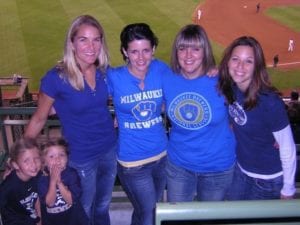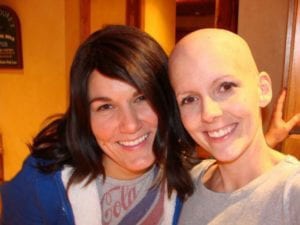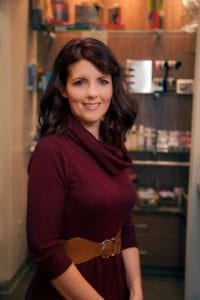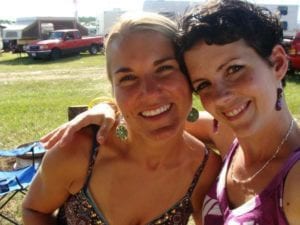Wisconsin; the land of beer, cheese, good-hearted people, and Maria Voermans – rare cancer survivor and now fierce advocate for the rare disease community.
Ten years ago, Maria had the scare of her life – quite literally. Seemingly overnight, Maria was facing the reality of a rare cancer diagnosis. Both life and the lives of her two young daughters turned upside down.
“Emergency Landing”
The earliest sign that something was wrong came when her oldest daughter was but 4 years old, and Maria was playing ‘airplane’ with her. As her daughter was soaring above Maria’s arms, Maria felt something akin to pulling a muscle in her leg.
“I joked that I had to make an emergency landing” recalls Maria. “From that point on, I was having chronic pain. I thought it was because I played a lot of volleyball.”
The pain in her leg persisted for days-turned-weeks-turned months.
At first, Maria thought it couldn’t be anything serious, because she didn’t feel a lump anywhere near the pain. Even her doctor assumed it was a pulled muscle.
It wasn’t until she went to see a sports medicine surgeon, who suggested she get an MRI for a closer look.
“Cancer didn’t cross my mind. I had no medical issues, no lump, nothing.”
So to Maria’s surprise, the sports medicine doctor quickly called a specialist upon seeing the MRI results. And not too long later, after a biopsy, Maria was diagnosed with Stage III proximal-type epithelioid sarcoma… on her youngest’s third birthday.
What is Epithelioid Sarcoma?
Epithelioid sarcoma is a rare, slow-growing type of soft tissue cancer. Most cases begin in the soft tissue under the skin of a finger, hand, forearm, lower leg or foot, though it can start in other areas of the body.
Typically, epithelioid sarcoma starts as a small firm growth or lump that’s painless. It usually starts out as a single growth, but multiple growths may occur by the time a person seeks medical help. Sometimes this sarcoma appears as ulcers that don’t heal, looking like open wounds over the growths.
Epithelioid sarcoma tends to have a high rate of recurrence and can spread to other areas.
“Numb”
Like most who weren’t familiar with rare cancers, Maria never heard of epithelioid sarcoma, but having worked in the veterinary field, Maria wasn’t completely unfamiliar with “sarcoma.”
“I knew that in the animal world, cats could get fibrosarcoma as a result of a certain vaccine. The vaccine was given in a rear leg because of the need for amputation should a sarcoma develop.
It’s easy to guess where Maria’s head took her to next.
“I thought I was going to have to have my leg amputated.”
Like any of us, Maria’s instinct is to Google her heart out. In fact, she described herself as a “Googler by nature.” But not for this.
“I just went numb.”
And maybe that was for the better. Sarcomas can be tough; their statistics even tougher. According to American Cancer society, the five year survival rate of soft tissue sarcoma patients (which epithelioid sarcoma is) is 56%.
You couldn’t blame Maria for being a little shellshocked – it’s difficult enough to receive such a diagnosis, but from muscle pain while playing with her little girl one day to a serious, rare cancer diagnosis the next relatively quickly… it was dizzying, to say the very least.
Maria was barely trying to catch her breath when she was strongly advised to pursue chemotherapy ASAP.
For those of you familiar with chemo, you know well – to put it mildly – the unpleasantness that awaited Maria.
“My chemo regimen was 4-5 days a week, 24 hours/day, 3 week break in between. I went through two cycles after which we re-scanned and the chemo didn’t appear to be working. Before we started they warned me that we only had 7-15% chance it would work. This type of sarcoma is not often chemo-responsive, but because I was young, otherwise healthy, and had two little girls to live for, they recommended I try it.
As physically difficult as it was, nothing compared to the emotional toll it took on Maria thinking about how to explain to her young girls (who were ages 4 and 3 then) that mommy was so sick, so suddenly.
Actually, I’ll correct myself with a bit of advice Maria learned from a child life specialist.
“Try not to say ‘Mommy’s sick.’ That’s what they said. Try not to use the word sick because little kids get sick all the time and we even tell them they’re sick. We don’t want them confused.”
Maria was grateful for the child life specialists, who helped her daughters in this strange new life translation from a once healthy and vibrant Maria to the difficult realties of chemotherapy and eventually radiation therapy.
Maria, too, would need some help transitioning. For starters, she was told she was going to lose her hair.
“I had long, thick, curly hair and I never even cut my hair short. So that really hit me.”
Becoming bald was a hard pill to swallow for her.
“I remember sitting in the waiting room, seeing these women so comfortable with their scarves on or even just bald, and I thought ‘Good for them. But I could never do that.’ It’s not vanity. It’s more that… I would be wearing a billboard that says ‘I have cancer.”
Less visible but ultimately longer lasting was losing her ability to conceive children.
“It’s been tough. Since then I remarried, and my husband didn’t have any children. It was something that was really difficult for me to accept, the fact that we couldn’t have a child of our own. I felt like a failure as a wife.”
She even made sure to tell her husband early in their relationship about her inability to conceived – giving him an “out” as she described it.
The Cancer Posse
Years later, with the experience firmly in retrospect, she’s in a great place with her family and with herself – but like all things, it was a process.
An integral part of that process was a group of three friends and her sister that she credits as major help.
“My medical team dubbed them the ‘cancer posse.’ They came to all my appointments, shuttled my kids to and from the hospital, provided us meals -I really couldn’t have done it without them.”

Despite this unexpected detour into Hell, Maria was helped put back on track by her incredible support system. And ‘Cancer Posse’ has a nice ring to it, eh?
Remember when Maria said she just never saw herself as one of those women embracing their bald and beautiful selves?
“I remember I was at the zoo with my kids and friends with kids about the same age as mine. I had my wig on as usual. We were eating lunch and it was so warm out, my head was itching. My friends noticed and said, ‘Just take it off. Why are you suffering?’ And so I did.”
But perhaps the better wig snatching example is that time she throw it onto the stage at a Phil Vassar concert! Hey – she was finally starting to get into the spirit of things!

And on that note, she also came to embrace some of the brighter sides of cancer; like the exclusive American Express-style currency known as “the cancer card.”
“I remember shopping at a store in my wheelchair and I flagged down an employee to ask them about a product that didn’t have a price tag. He took one look at me and said ‘For you, $20.”
Surely cancer is no cake walk, but having support helps!
So thanks to the radiation therapy, Maria was en route to physical health and thank to the cancer posse, she was en route to emotional health.
In late January of 2009, she had surgery to remove the tumor. After a brief hiccups of cellulitis and a 15-inch scar, Maria made a tremendous recovery. How tremendous?
“Well, 9 months later I ran a 5k.”
Not too shabby, Maria!
Life Lived, Lessons Learned
Ten years, Maria still has the all-clear from her doctor. As happy as she is, she is aware she is one of the lucky ones.
“Survivor’s guilt is always with me. As I have met patients with similar or even less aggressive diagnoses in my line of work, it has been incredibly difficult to process their negative outcomes.”
Maria shares a particular instance that affected her.
“I got to know a young man the same age I was when I was diagnosed. He looked to me for hope because of my positive outcome. After only a year, he succumbed to his sarcoma and I really struggled with why that should happen to someone with so much life left to live. I still feel guilty sometimes.”
Which makes Maria so uniquely qualified in her job today as a program coordinator for cancer support services at Froedtert & the Medical College of Wisconsin, where she can have a direct hand in helping cancer patients deal with their diagnoses and provide patient support and education.
In many ways, she’s just paying it forward.
“It motivates me that much more to make sure my life and the work I do has meaning and makes an impact. I feel that because my life was spared, I owe something to humanity.”
But perhaps the best way to “repay the debt to humanity” (to paraphrase Maria) is to live your best life, and Maria seems to be doing just that.
A midwestern gal through and through, she’s devoted to her winter sports, Green Bay Packers, and cheese.
And in addition to the wonderful work she does for her own cancer community and her tight-nit family and friends, Maria and her daughters have wandered into a little side hustle – macarons!
In fact, Maria even finds a nice metaphor in baking macarons with her own medical battles.
“They are a challenging dessert to make! It takes precision, teamwork, and a desire to keep moving forward no matter what obstacles you come across. Like pushing through cancer treatment, I’ve learned that there are myriad ways to approach making macarons, and no one way is perfect. Rather, find the process that works for you and own it, knowing you can change course at any time to adjust to your own situation.”
In fact, for any Milwaukee-area readers, check them out – Emerald City Macarons!
Considering it’s been just about 10 years since Maria’s diagnosis and battle, she’s hit a major milestone. And very clear lessons and points of advice have emerged.
“Having a rare disease can feel extremely isolating. Just know that you are not alone. Seek out support from a mentor with your same disease if you can find one. Connecting to just one other person who can truly empathize can make all the difference. “
But perhaps the best lesson of them all – our rallying cry here at Patient Worthy:
“Be your own advocate!! If you are not satisfied with your care, do not be afraid to speak up. It’s your life!”
Thank you, Maria, for leading by example!








